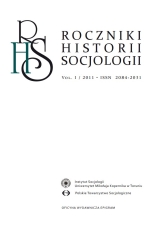Czy klasztory przyczyniły się do powstania kapitalizmu? Wątki monastyczne we wczesnych pracach Webera
Abstract
The aim of the article is the reconstruction of selected monastic motifs in the early works of Max Weber. The monastic motifs appear at an initial and later works of this author and are connected with his studies on religion, and in particular application and a central location in his network of notions of the term “asceticism” derived from the idea of monkish life. In his early studies of religion, monasticism is discussed in the context of relationship between the Protestant ethics and development of the modern capitalism (The Protestant Ethics and the Spirit of Capitalism) (2014, first edition 1905, second post-mortem edition 1920). At this stage of his work, the Catholic monasticism becomes for Weber a key argument in his discussion concerning the importance of the inter-world asceticism (it is perceived as its ideological source), and in a broader sense its role in the shaping of (modern) economic rationalism (as a source of rational techniques to organize the way of life). In the later phase of Weber’s reflection on religion, the notion of monasticism is understood in a broader and more problematic way. He focuses on the eastern and western monasticism and makes comparison between them.
 Roczniki Historii Socjologii
Roczniki Historii Socjologii